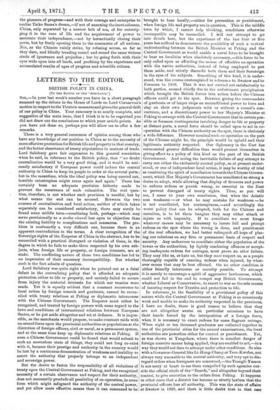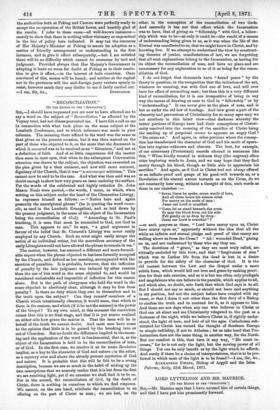LETTERS TO THE EDITOR.
BRITISH POLICY IN CHINA.
[TO THE EDITOR OF THE SPECTATOR.1
Sin,—In your last week's number you have in a short paragraph summed up the debate in the House of Lords on Lord Carnarvon'a motion in respect to the Tientsin massacre and given the general drift of our policy in China. Your summary is so nearly complete, and suggestive of the main issue, that I think it is to be regretted you did not draw out the conclusions to which your article points. As you have not done so, perhaps you will allow me to offer a few remarks.
There is a very general consensus of opinion among those who have any knowledge of our position in China as to the necessity of more effective protection for British life and property in that country, and the better observance of treaty stipulations in matters of trade. Lord Salisbury gave fair expression to this general conviction when he said, in reference to the British policy, that " no doubt centralization would be a very good thing, and it would be emi- nently satisfactory if European power could induce the central authority in China to keep its people in order at the several ports ; but in the meantime, while the ideal policy was being carried out, horrible catastrophes might recur again and again." There has certainly been no adequate provision hitherto made to prevent the recurrence of such calamities. The real ques- tion, therefore, is not whether such provision is needful, but by what means the end can be secured. Between the two courses of centralization and local action, neither of which taken separately can be considered satisfactory, there may surely be found some middle term—combining both, perhaps—which may serve provisionally as a modus vivendi less open to objection than the existing liability to complications and massacres. The pro- blem is confessedly a very difficult one, because there is an apparent contradiction in the terms. A clear recognition of the Sovereign rights of the Emperor of China in the abstract, has to be reconciled with a practical disregard or violation of these, in the degree in which he fails to make them respected by his own sub- jects, when foreign life or property, or foreign interests, are at stake. The conflicting nature of these two conditions has led to an impression of their necessary incompatibility. But whether such is the fact admits of question.
Lord Salisbury was quite right when he pointed out as a fatal defect in the centralizing policy that it afforded no adequate protection either to life or property, and entirely failed to secure from injury the material interests for which our treaties were made. Yet it is equally evident that a constant recurrence to local action by foreign consuls and gunboats, cannot be recon- ciled with treaty relations at Peking or diplomatic intercourse with the Chinese Government. The Emperor must either be recognized, and treated by foreign powers with some regard to the laws and conditions of international relations between European States, or be put aside altogether and set at defiance. It is impos- sible, as the merchants would propose, to make constant raids with an armed force upon the provincial authorities or populations at the discretion of foreign officers, civil or naval, as a permanent system, and at the same time keep up diplomatic relations at Peking. If even a Chinese Government could be found that would submit to such an anomalous state of things, they could not long co-exist with it, because their prestige and authority in the country would be lost by a continuous demonstration of weakness and inability to assert the authority that properly belongs to an independent and sovereign power.
But the desire to fasten the responsibility of all violations of treaty upon the Central Government at Peking, and the recognized necessity of a certain observance and respect for their authority, does not necessarily preclude all possibility of co-operation, in some form which might safeguard the authority of the central power, and yet allow more effective means than it can command to be
brought to bear locally,—either for prevention or punishment, when foreign life and property are in question. This is the middle term by which, I cannot help thinking, conditions otherwise incompatible may be reconciled. I will not attempt to go into details here, but the experience of the last four or five years has sufficed to demonstrate the possibility of such a mutual understanding between the British Minister at Peking and the Central Government as would enable a naval force to be brought to bear on localities when absolutely necessary,—this force to be only called upon as affording the means of effective co-operation with the native authorities, instead of being employed to put them aside, and utterly discredit both them and their Sovereign in the eyes of his subjects. Something of this kind, it is under- stood, was the course contemplated in reference to Swatow and to Formosa in 1868. That it was not carried out satisfactorily to both parties, seemed chiefly due to the unfortunate precipitation which brought the British forces into action before the Chinese officers could get to the spot. Between giving the commanders of gunboats or of larger ships an unconditional power to burn and slay on their own judgments with or without a consul's con- currence, and a discretionary power to her Majesty's Minister at Peking to arrange with the Central Government that in certain pos- sible or foreseen contingencies involving danger to life or property at distant ports, a naval force should be called upon to act in co- operation with the Chinese authority on the spot, there is obviously a wide difference. However nominal such co-operation on the part of the Chinese might be, the principle would be upheld and their legitimate authority respected. Our diplomacy in the East has surmounted greater difficulties than would present themselves in giving effect to a policy of this kind on the part of the British Government. And seeing the inevitable failure of any attempt to carry out either the exclusively central policy, as at present under- stood, or one of independent local action, it may be worthy of trial as combining the spirit of conciliation towards the Chinese Govern- ment, which Her Majesty's Government has manifested so strong a desire to adopt, while allowing that display of firmness and power to enforce redress or punish wrong, so essential in the East to prevent disregard of treaty rights. Thus, as you will see, I come to your own conclusion, that when the Asiatic sees weakness — or what he may mistake for weakness — he is not conciliated, but contemptuons,—and accordingly the worst policy that can be adopted, both for the Chinese and ourselves, is to let them imagine they may either attack or injure us with impunity. If to conciliate we must forego whatever means may be necessary to insure full and prompt redress on the spot where the wrong is done, and punishment of the real offenders, we had better relinquish all hope of plac- ing our relations on any firm or permanent basis of respect and security. Any endeavour to conciliate either the population of the towns or the authorities, by lightly condoning offences or accept- ing inadequate redress for outrages, must prove an utter failure. They may like us, or hate us, but they must respect us, as a people thoroughly capable of exacting redress when injured, by what- ever means that may be best effected. On no other condition is either friendly intercourse or security possible. To attempt it is merely to encourage a spirit of aggressive lawlessness, which could not fail in the end to compel any British Government, whether Liberal or Conservative, to resort to war as the sole means of insuring respect for Treaties and protection to life.
In reference ,to the feasibility of a provisional policy of this nature while the Central Government at Peking is so consciously weak and unable to make its authority respected in the provinces, I have no doubt, there is good reason to believe that they are not altogether averse on particular occasions to have their hands forced by the interposition of a foreign force, when it is necessary to exact redress for some flagrant outrage. When eight or ten thousand graduates are collected together in one of the provincial cities for the annual examinations, the local
authorities are powerless either for control or punishment. Yet, as was shown at Yangchow, where there is manifest danger of foreign coercive means being applied, they are enabled to act,—in a
way they would not dare to attempt under other conditions. So also with a Governor-General like Li-Hung-Chang or Tsen-Kwofan, not always very amenable to the central authority, and very apt to dis- regard orders when foreigners are concerned,—the Tsungli-Yamen is not sorry at heart to see them compelled by such agencies out-
side the official circle of the "Boards," and altogether beyond their
control, to give execution to the orders from Peking. It happens in other cases that a district has become so utterly lawless that the
provincial officers lose all authority. This was the state of affairs at Swatow in 1869, and there is little doubt that in that case
the authorities both at Peking and Canton were perfectly ready to accept the co-operation of the British forces, and heartily glad of the results. I refer to these cases—all well-known instances— merely to show that there is nothing either visionary or unpractical in the line of policy here indicated. It may tax the resources of Her Majesty's Minister at Peking to secure its adoption as a matter of friendly arrangement or understanding in the first instance, and to give it effect subsequently,—but I am satisfied there will be no difficulty which cannot he overcome by tact and judgment. Provided always that Her Majesty's Government in adopting it leave no room for doubt at Peking as to their resolu- tion to give it effect,—in the interest of both countries. Once convinced of this, means will be found ; and neither at the capital nor in the provinces will the anti-foreign party venture openly to resist, however much they may dislike to see it fairly carried out.



































 Previous page
Previous page